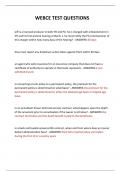-
1. Exam (elaborations) - Nrnp 6531 final exams test bank , nrnp 6531n final exams test bank, •&tab;updated ques...
-
2. Exam (elaborations) - Nrnp 6531 final exams test bank, nrnp 6531n final exams test bank, • updated questi...
-
3. Exam (elaborations) - Nrnp 6531 final exam (latest 7 versions q & a), nrnp 6531 final exams, nrnp 6531n fin...
-
4. Exam (elaborations) - Nrnp 6531 midterm exams (latest 3 versions), nrnp 6531n midterm exams, updated questi...
-
5. Exam (elaborations) - Nrnp 6540 week 1,3,4,5,7,8,9,10 knowledge check, question and answers. walden univers...
-
6. Exam (elaborations) - Nurs 6541 midterm exam (latest 7 versions, 700 q & a), nurs 6541n midterm exam, nrnp ...
-
7. Exam (elaborations) - Nurs 6541 final exam (latest 5 versions, 500 q & a), nurs 6541n final exam, nrnp 6541...
-
8. Exam (elaborations) - Nrnp 6541 knowledge check week 3, nurs 6541n kc, nrnp 6541- primary care of adolescen...
-
9. Exam (elaborations) - Nrnp 6550 -i- human ken fowler, nrnp 6550 - advanced practice care of adults in acute...
-
10. Exam (elaborations) - Nrnp 6550 i human darrell bridges, nrnp 6550 - advanced practice care of adults in ac...
-
11. Exam (elaborations) - Nrnp 6550 week 9 knowledge check, nrnp 6550 - advanced practice care of adults in acu...
-
12. Exam (elaborations) - Nrnp 6550 final exam-(189 correct answers), nrnp 6550n final exam, nrnp 6550 - advanc...
-
13. Exam (elaborations) - Nrnp 6552 final exam latest, nrnp 6552n final exam, advanced nurse practice in reprod...
-
14. Exam (elaborations) - Nrnp 6552 final exam latest (version 1), nrnp 6552n final exam, advanced nurse practi...
-
15. Exam (elaborations) - Nrnp 6552 midterm exam latest (version 2), nrnp 6552n final exam, advanced nurse prac...
-
16. Exam (elaborations) - Nrnp 6552 midterm exam latest (version 1), nrnp 6552n final exam, advanced nurse prac...
-
17. Exam (elaborations) - Nrnp 6552 week 10 knowledge check, advanced nurse practice in reproductive health car...
-
18. Exam (elaborations) - Nrnp 6552 week 5 quiz, advanced nurse practice in reproductive health care , question...
-
19. Exam (elaborations) - Nrnp 6552 module 1 assignment taking a health history building a health history, adva...
-
20. Exam (elaborations) - Nrnp 6560 final exam (2 versions, 200 q & a, latest-2023/2024) / nrnp 6560 n final e...
-
21. Exam (elaborations) - Nrnp 6560 midterm exam (2 versions, latest, 200 q & a) / nrnp 6560n midterm exam / nr...
-
22. Exam (elaborations) - Nrnp 6566 midterm study. guide nrnp 6566 midterm exam latest questions and answers we...
-
23. Exam (elaborations) - Nrnp 6566 final exam, nrnp 6566/ nrnp6566 advanced care of adults in acute settings i...
-
24. Exam (elaborations) - Nrnp 6568 week 9 comprehensive practice, nrnp 6568 -synthesis in advanced nursing pra...
-
25. Exam (elaborations) - Nrnp 6568 week 8 comprehensive practice (set-2), nrnp 6568 -synthesis in advanced nur...
-
26. Exam (elaborations) - Nrnp 6568 week 8 comprehensive practice (set-1), nrnp 6568 -synthesis in advanced nur...
-
27. Exam (elaborations) - Nrnp 6568 week 7 comprehensive practice (set-3), nrnp 6568 -synthesis in advanced nur...
-
28. Exam (elaborations) - Nrnp 6568 week 7 comprehensive practice (set-2), nrnp 6568 -synthesis in advanced nur...
-
29. Exam (elaborations) - Nrnp 6568 week 7 comprehensive practice (set-1), nrnp 6568 -synthesis in advanced nur...
-
30. Exam (elaborations) - Nrnp 6568 week 5 comprehensive practice, nrnp 6568 -synthesis in advanced nursing pra...
-
31. Exam (elaborations) - Nrnp 6568 week 4 comprehensive practice-set-2, nrnp 6568 -synthesis in advanced nursi...
-
32. Exam (elaborations) - Nrnp 6568 week 4 comprehensive practice-set-1, nrnp 6568 -synthesis in advanced nursi...
-
33. Exam (elaborations) - Nrnp 6568 week 2 comprehensive practice, nrnp 6568 -synthesis in advanced nursing pra...
-
34. Exam (elaborations) - Nrnp 6568 final exam, nrnp 6568 -synthesis in advanced nursing practice of patients i...
-
35. Exam (elaborations) - Nrnp 6568 week 1-9 knowledge check, nrnp 6568 -synthesis in advanced nursing practice...
-
36. Exam (elaborations) - Nrnp 6568 quiz 10, nrnp 6568 -synthesis in advanced nursing practice of patients in f...
-
37. Exam (elaborations) - Nrnp 6568 quiz 7, nrnp 6568 -synthesis in advanced nursing practice of patients in fa...
-
38. Exam (elaborations) - Nrnp 6568 quiz 1-6, nrnp 6568 -synthesis in advanced nursing practice of patients in ...
-
39. Exam (elaborations) - Nrnp 6635 study guide(final-exam), nrnp 6635 - psychopathology and diagnostic reasoni...
-
40. Exam (elaborations) - Nrnp 6635 final-exam, nrnp 6635 - psychopathology and diagnostic reasoning, walden un...
-
41. Exam (elaborations) - Nrnp 6635 final exam, nrnp 6635 - psychopathology and diagnostic reasoning, walden un...
-
42. Exam (elaborations) - Nrnp 6635 mid term exam, nrnp 6635 - psychopathology and diagnostic reasoning, walden...
-
43. Exam (elaborations) - Nrnp 6640 week 6 midterm exam -psychotherapy (version 2) 75 q & a, walden university.
-
44. Exam (elaborations) - Nrnp 6640 week 6 midterm exam -psychotherapy (version 1) 75 q & a, walden university.
-
45. Exam (elaborations) - Nrnp 6640 final exam -psychotherapy (version 2) 75 q & a, walden university.
-
46. Exam (elaborations) - Nrnp 6640 final exam -psychotherapy (version 1) 75 q & a, walden university.
-
47. Exam (elaborations) - Nrnp 6645 group final review study guide, nrnp 6645 - psychotherapy with multiple mod...
-
48. Exam (elaborations) - Nrnp 6645 week 11 final exam, nrnp 6645 - psychotherapy with multiple modalities, wal...
-
49. Exam (elaborations) - Nrnp 6645 midterm review study guide, nrnp 6645 - psychotherapy with multiple modalit...
-
50. Exam (elaborations) - Nrnp 6645 midterm exam (version 3) questions and answers, nrnp 6645 - psychotherapy w...
-
51. Exam (elaborations) - Nrnp 6645 midterm exam (version 2) questions and answers, nrnp 6645 - psychotherapy w...
-
52. Exam (elaborations) - Nrnp 6645 midterm exam (version 1) questions and answers, nrnp 6645 - psychotherapy w...
-
53. Exam (elaborations) - Nrnp 6665 midterm exam (latest), nrnp 6665 pmhnp care across the lifespan i, walden u...
-
54. Exam (elaborations) - nrnp 6665 final exam (latest), nrnp 6665 pmhnp care across the lifespan i, walden un...
-
55. Exam (elaborations) - nrnp 6665 week 4-assignment, mood disorders, nrnp 6665 pmhnp care across the lifespa...
-
56. Exam (elaborations) - Nrnp 6665 assignment 2 focused soap note and patient case presentation, nrnp 6665 pmh...
-
57. Exam (elaborations) - Nrnp 6675 final exam, nrnp 6675: psychiatric mental health nurse practitioner care ac...
-
58. Exam (elaborations) - Nrnp 6675 week 11 final exam, nrnp 6675: psychiatric mental health nurse practitioner...
-
59. Exam (elaborations) - Nrnp 6675 week 6 midterm exam, nrnp 6675: psychiatric mental health nurse practitione...
-
60. Exam (elaborations) - Nrnp 6675 week 3 assignment nrnp 6675 care across the lifespan ii, nrnp 6675: psychia...
-
Show more





